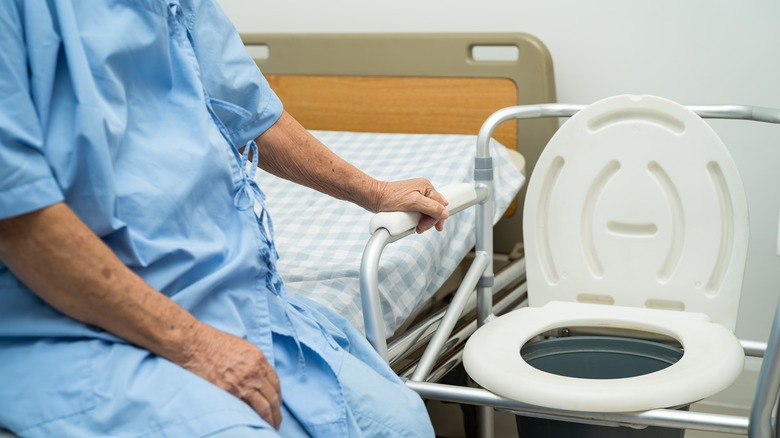What Really Happens To Your Poop At The End Of Life
We often think about death when someone close to us dies. What happens to a person's soul or essence once they leave this earth? Do they disintegrate into the earth and that's it? Or is there something more, like an afterlife? Science has long been interested in answering these questions. That is why there's information related to what it means when people see ghosts before death and an organism that stays alive in your body even after death.
With that said, have you ever wondered about bowel movements when someone's end is near? You probably already know that a lot of physiological and behavioral changes accompany the final moments before death, like increased fatigue, lots of time spent asleep, a lack of appetite, a loss of interest in things they previously found engaging, confusion, hallucinations, pain, and muscle weakness.
It is also not uncommon for your loved one to experience incontinence and loss of bowel control when their muscles relax at the end of life. Their body and its mechanisms are essentially shutting down or reducing efficiency, and their poop habits can change because of this. Diarrhea is also a concern and can occur if the person has an infection or is going through chemotherapy or radiation therapy. Medications, certain diseases, and corresponding surgeries could also lead to diarrhea. Another common poop-related change has to do with constipation.
Constipation when you're nearing death: Explained
A person nearing death can be constipated for a few different reasons, according to experts. Long-term use of painkillers, like narcotic and non-narcotic pain pills, is one reason. "Narcotic and non-narcotic pain medicines slow bodily functions and constipation becomes a big issue," explained end-of-life educator and registered nurse Barbara Karnes (via BK Books).
And if you thought someone nearing their final hours may not need to poop because they're not eating as much, think again. Your body produces waste even when you're not eating anything, per the experts. However, not getting sufficient nutrition (especially fiber), not hydrating as much, and a lack of physical activity and movement can also cause a person to experience constipation.
If the person who's dying has a chronic illness, the disease itself could be the trigger that changes poop habits. For example, a tumor obstructing the intestines, a colon affected by diabetic neuropathy, or changes to neurological and muscle function (particularly digestive muscles) because of Parkinson's disease or some other progressive disease can all be causes. Other symptoms that often accompany constipation include excessive gas, bloating, burping, stomach pain, headaches, nausea, abdominal distention, and straining while pooping.
How to handle near-death bowel movement changes
While your loved one's poop frequency will reduce when death is near, it is still important to monitor what happens to the bowel movements. If they've not pooped in 2-3 days, alert the hospice care worker. Laxatives can be a useful resource, especially if your loved one has been on pain medications for a long time. A doctor can assess disease history, prescribe pain medication, and recommend the right kind of laxative to help with constipation. Laxatives might be discontinued, however, if the person hasn't eaten for several days.
Special attention should also be paid to other symptoms like blood in the poop or anal area, no bowel movement after taking a laxative, and persistent cramps and vomiting. Keep an eye out for non-verbal cues, like strain in the face while trying to poop, especially when someone nearing death is unable to communicate effectively with you (e.g., if they have Alzheimer's).
Changes in diet might also be an option to treat constipation and diarrhea. Healthcare providers might recommend increasing fluid intake, adding more fiber, and avoiding dairy in the case of constipation. They may also advise the person to move around (with assistance) if possible to stimulate bowel movement. Ultimately, it is important to understand that losing bowel control, diarrhea, and constipation are part and parcel of end-of-life care. For a loved one, it can be distressing to watch, but by keeping an eye out for discomfort and working with professionals, you can make your loved one feel as comfortable as possible.



